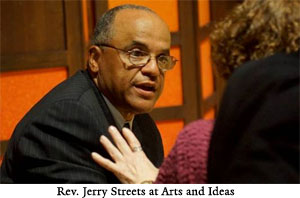There’s nothing like issues of race to get people talking in America.
During the International Festival of Arts and Ideas, an annual 15-day celebration of artists and thinkers that takes place in New Haven, Yale Divinity School co-sponsored a panel discussion entitled “Preparing for 2050: The Changing Face of Race in America.”

Following the discussion, I heard three people make widely different comments about their own experiences of the dynamics of race. One man informed me that the older generation’s definitions of racial conflict today sound irrelevant to young people, who just don’t think (and worry) about race the way their elders do.
Another man wondered why we still talk about “race” at all, since it doesn’t exist genetically and scientifically.
Soon a woman emailed me to report that her grade-school-age multiracial grandson is very worried that he doesn’t look white enough to be accepted in America. To her, the old, old issues of racial prejudice are stubbornly, painfully contemporary and future-tensed.
This sample of opinion caught the fluidity of the moment. It also signals the moment’s lack of harmonized experiences of race, its divided opinion about the America future. This makes pondering the coming years a hazardous adventure.
We can name a few big trends shaping the next decades. The number of people claiming more than one racial identity—9 million Americans in the 2010 Census—is surging. So is ethnic intermarriage: 15 percent of all new marriages in 2010 were interracial. We can expect more and more hyphenated names, more intermingling. Look for strange political transfigurations. Some day, because of immigration, Texas will likely turn Democrat. Some day, because of changing ethnic demographics, the South will leave behind its black-white binary travails. Some day that increasingly farcical word “Caucasian” will be quietly shelved.
What is impossible to know is how power will be realigned in a nation where no ethnic group dominates any longer. Which voices will declaim the new narrative? Will new ethnic voting blocs rise up to be counted? Will historic civic values be redefined? What will race mean in a country of scores of multi-ethnic identities? Will there be fewer ethnic tensions, or new ones?
At the Arts and Ideas panel of Reflections writers, the audience seemed to me most riveted by the candid personal stories and asides they heard—a pivotal encounter with prejudice, the freedom (or ambivalence) one feels about a multi-racial background. In an era of demographic drama and official celebration of multiculturalism, people will be looking for more of this—honest reports of personal revelation and national paradox from the bewildering, exciting landscape of social transformation.
photo courtesy: Tom Ficklin ‘75 M.Div.
| Attachment | Size |
|---|---|
| 3.58 KB |